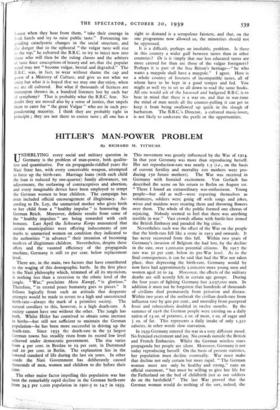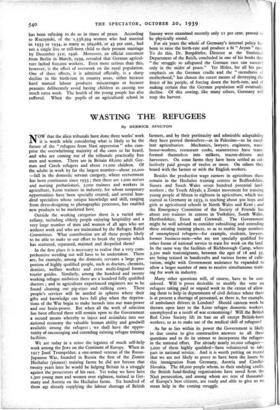HITLER'S MAN-POWER PROBLEM
By RICHARD M. TITMUSS
UNDERLYING every social and military question in Germany is the problem of man-power, both qualita- tive and quantitative. For six propaganda-riddled years the Nazi State has, with every conceivable weapon, attempted to force up the birth-rate. Marriage loans (with each child the loan is reduced by one-quarter) family allowances, tax adjustments, the outlawing of contraceptives and abortion, and every imaginable device have been employed to tempt the German women to bear children. The campaign has even included official encouragement of illegitimacy. Ac- cording to Dr. Ley, the unmarried mother who gives birth to her child from a "healthy impulse" is honouring the German Reich. Moreover, definite results from some of the "healthy impulses" are being rewarded with cash bonuses. Last April the Schwarze Korps announced that certain municipalities were offering inducements of 500 marks to unmarried women on condition they indicated to the authorities "in advance" their intention of becoming mothers of illegitimate children. Nevertheless, despite these offers and the vaunted efficiency of the propaganda machine, Germany is still io per cent. below replacement level.
There are, in the main, two factors that have contributed to the waging of this demographic battle. In the first place is the Nazi philosophy which, trimmed of all its mysticism, is nothing less than a reversion to the ethnic level of the jungle. ." War," proclaims Mein Kampf, "is glorious."
Therefore, "in eternal peace humanity goes to pieces." It follows logically from such an attitude that desperate attempts would be made to revert to a high and unrestricted birth-rate—always the mark of a primitive society. The natural corollary to this, however, is a high death-rate. A society cannot have one without the other. The jungle has both. Whilst Hitler has contrived to obtain some increase in births—but still not sufficient to maintain the German population—he has been more successful in driving up the death-rate. Since 1933 th, . death-rate in the 51 largest German towns has steadily risen from its record low level achieved under democratic government. The rise varies from 4 per cent. in Breslau to 19 per cent. in Dortmund and 20 per cent. in Berlin. The explanation lies in the lowered standard of life during the last six years. In other words the Nazi Government has deliberately caused thousands of men, women and children to die before their time.
The other major factor impelling this population war has been the remarkably rapid decline in the German birth-rate from 34.3 per ',Goo population in 1901-5 to 14.7 in 1933. This movement was greatly influenced by the War of 1914. In that year Germany was more than reproducing herself.
Her net reproduction-rate was nearly x.5 (i.e., on the basis of current fertility and mortality roo mothers were pro- ducing x so future mothers). The War was received in Germany with frenzied excitement. Von Gerlach has described the scene on his return to Berlin on August xst. "There I found an extraordinary war-enthusiasm. Young people—but old as well—were reporting themselves as volunteers, soldiers were going off with songs and jokes, wives and maidens were treating them and throwing flowers over them. The whole of the public formed one chorus of rejoicing. Nobody seemed to feel that there was anything terrible in war." Vast crowds aflame with battle-lust stoned the British Embassy and paraded the big cities.
Nevertheless such was the effect of the War on the people that the birth-rate fell like a stone in 1915 and onwards. It has never recovered from this fall. Within two years of Germany's invasion of Belgium she had lost, by the decline in the rate, over r,000,000 potential citizens. By 1917 the rate was 50 per cent, below its pre-War level. As to the final consequences, it can be said that had the War not taken place, thus depressing the birth-rate, Germany would by now have had approximately 2,000,000 more young men and women aged 20 to 24. Moreover, the effects of the military deaths are still acutely felt in certain age groups. During the four years of fighting Germany lost 2,037,000 men. In addition it must not be forgotten that hundreds of thousands of civilians died prematurely from privation and disease. Within two years of the outbreak the civilian death-rate from influenza rose by 400 per cent., and mortality from puerperal fever and tuberculosis doubled in twelve months. By the summer of 1916 the German people were existing on a daily ration of 13 oz. of potatoes, 2 oz. of meat, i oz. of sugar and oz. of fat. This represents a daily intake of only 1,350 calories, in other words slow starvation.
In 1939 Germany entered the war in a very different mood. No frenzied excitement and joy. No crowds outside the British and French Embassies. Whilst the German wireless roars propaganda her people are silent. Moreover, Germany is not today reproducing herself. On the basis of present statistics, her population must decline eventually. War must make that decline not only certain but more rapid. "The German woman must not only be healthy and strong," runs an official statement, "but must be willing to give her life for the Fatherland on the bed of childbirth just as our soldiers do on the battlefield." The last War proved that the German woman would do nothing of the sort, indeed, she has been refusing to do so in times of peace. According to Kuczynski, of the 1,338,394 women who had married in 1933 Or 1934, as many as 569,088, or 43 per cent., had not a single live or still-born child to their present marriage by December 31st, 1936. Moreover, an official statement from Berlin in March, 1939, revealed that German agricul- ture lacked 800,000 workers. Even more serious than this, however, is the effect of overwork on the rural population. One of these effects, it is admitted officially, is a sharp decline in the birth-rate in country areas, either because hard manual labour produces miscarriages or because peasants deliberately avoid having children as causing too much extra work. The health of the young people has also suffered. When the pupils of an agricultural school in Saxony were examined recently only x i per cent, proved t,. be physically sound.
For six years the whole- of Germany's internal policy ha been to raise the birth-rate and produce a fit " Aryan " race. To do this, Dr. Burgdorfer, Director at the Statistic,: Department of the Reich, concluded in one of his books that "the struggle to safeguard the German race can succeel only in the midst of peace." Yet Hitler, for all his past emphasis on the German cradle and the "sacredness et motherhood," has chosen the surest means of destroying the fittest of his people, of forcing down the birth-rate, and of making certain that the German population will eventually decline. Of this sowing, like many others, Germany will reap the harvest.













































 Previous page
Previous page